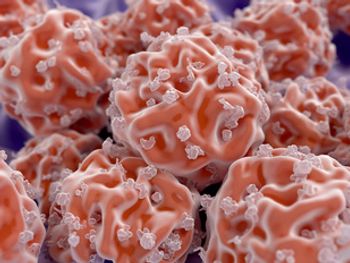
As novel therapies drive up the cost of drugs, it is becoming increasingly difficult for community oncologists to keep costs below value-based care program targets, according to a new survey from Integra Connect.

Laura Joszt, MA, is the vice president of content for the managed care and pharmacy brands at MJH Life Sciences®, which includes The American Journal of Managed Care®, Managed Healthcare Executive®, Pharmacy Times®, and Drug Topics®. She has been with MJH Life Sciences since 2011.
Laura has an MA in business and economic reporting from New York University. You can connect with Laura on LinkedIn or Twitter.

As novel therapies drive up the cost of drugs, it is becoming increasingly difficult for community oncologists to keep costs below value-based care program targets, according to a new survey from Integra Connect.


Increased transparency, value-based pricing, and other policy reforms are necessary to ensure that Americans can access medications at affordable prices, a panel of experts said during a US Senate hearing January 29, 2019.

Panelists discuss what PCSK9 inhibitors are, the evidence to support them, and challenges with operationalizing them in practice.

Electronic medical record data on patients with multiple sclerosis is generally consistent with research data and can be used to expand research opportunities, according to a new study.

A lack of diversity in cell lines used for laboratory studies means underrepresented populations and minorities might not benefit from precision medicines as quickly as people from European ancestry.

The Department of Justice now backs the ruling from a district court judge in Texas that said the entire Affordable Care Act (ACA) is invalidated without the individual mandate, which was removed when Congress reduced the penalty to $0.

While no one country has perfected use of digital health, there are some takeaways from what other countries are doing successfully, according to John D. Halamka, MD, MS, chief information officer, Beth Israel Deaconess Health System.

Researchers found that a prescription for healthy food can improve health outcomes for beneficiaries in Medicare and Medicaid.

A diverse panel of representatives from different practice models provided insights into what has worked for them and what has not in trying to improve cancer care. The discussion took place in Washington, DC, at the Association of Community Cancer Centers

Patients with high-risk breast cancer who receive a 21-gene assay genomic test may be able to avoid chemotherapy and ultimately save a significant amount of money.

Value-based insurance design (VBID) aligns patient cost sharing with the value of clinical services, so that patients pay less for high-value services and more for unnecessary, low-value services. While there has been increased interest in VBID, with CMS expanding the VBID demonstration in Medicare Advantage to all 50 states, the situation on the state exchanges is different: The plan has to be cost neutral, so in order to remove cost sharing for high-value services, cost sharing has to increase for other, low-value services.

While the high price of drugs is an issue, what is really important is the actual cost patients are faced with at the pharmacy counter, said Ted Okon, executive director of the Community Oncology Alliance, and Daniel Klein, president and executive director of the Patient Access Network Foundation, at the University of Michigan Center for Value-Based Insurance Design (V-BID), V-BID Summit.

A compressed vaccine schedule for older adults could help increase uptake and decrease the impact of the influenza vaccine’s waning effectiveness as months go by, but such a schedule would not be beneficial if flu season peaks early or if a compressed schedule results in a decrease in vaccine uptake.

The concept of value is a well-known topic among health policy experts, the payer community, and policy makers, but patients do not necessarily have the same idea of what value means. When discussions about removing low-value care from the system to save money come up, patients might get the wrong idea of what is going on and why.

The Virginia Center for Health Innovation (VCHI) is receiving a $2.2 million grant from Arnold Ventures to launch a 3-year statewide pilot to reduce the use of low-value care in the state of Virginia.

Minimal residual disease (MRD) testing is the future of diagnostics and monitoring for cancer, according to some experts. Not only can MRD determine the depth of response to a treatment, but it can also be used to determine treatment strategies.

Pediatric multiple sclerosis (MS) represents a small minority of MS diagnoses. WIth symptoms that differ from adults, children with MS often experience delays before they are diagnosed.

Interventions to prevent job loss for patients with multiple sclerosis (MS) should focus on increasing self-efficacy, especially for patients older than 50 years.

Costs remain the top concern of healthcare purchasers of pharmacy benefits, but employers are also concerned with ensuring appropriate use of medication and adherence to medication, according to a new report from the Pharmacy Benefit Management Institute (PBMI).

While use of palliative care at the end of life has increased, disparities remain, and not all patients who are terminally ill with blood cancers are having discussions about their goals of care at the end of life.

Two abstracts presented at the Transplantation and Cellular Therapy Meetings analyzed the detection of minimal residual disease during and after hematopoietic stem cell transplantation.

Low-value care that offers no benefit to patients, or can actually cause more harm than good, is costly to patients and the healthcare system. While low-value services are being identified and measured, it has been more difficult to reduce the use of low-value care.

Since carfilzomib was approved at a 27 mg/m2 twice-weekly dose, it has since been optimized at 56 mg/m2 twice-weekly and a recent study found benefits of a 70 mg/m2 once-weekly dose. However, most patients are still treated with the original approval dosage, suggesting they might be undertreated.

Nearly 10% of drug approvals in 2018 were generic products for branded drugs that had no FDA-approved generics.

A new study determines the smallest change in upper extremity function that patients with multiple sclerosis (MS) find important or meaningful through an analysis in the change of scores of the Arm Functiom in Multiple Sclerosis Questionnaire.

A high proportion of patients with acute myeloid leukemia (AML) who achieve a negative minimal residual disease (MRD) status still relapse, indicating a more sensitive method of detecting MRD is needed.

Updates on the Oncology Care Model from the Patient-Centered Oncology Care® meeting.

Researchers have used positron emission tomography scans to identify which patients with a type of human epidermal growth factor receptor 2–positive breast cancer might benefit most from targeted agents alone and can be spared chemotherapy.

Employers are placing an increased focus on healthcare benefits and integrating or expanding healthcare offerings. With healthcare costs rising, employers are focusing not only on health plans but also on ways to improve employee experience with healthcare.

259 Prospect Plains Rd, Bldg H
Cranbury, NJ 08512
© 2025 MJH Life Sciences®
All rights reserved.
